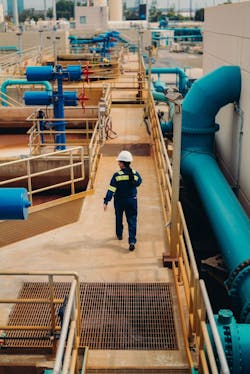Creating an efficient engineering organization is difficult when your engineers are spread across five continents. For Veolia, a French transnational company with nearly 179,000 employees that provides sustainable water, waste and energy management solutions for communities and companies around the world, this has been an ongoing challenge as the company has expanded its geographic reach.
To better grasp the expanse of Veolia’s operations, in 2019 alone the company supplied more than 98 million people with drinking water, 67 million people with wastewater services and converted 50 million metric tons of waste.
Veolia Water Technologies, a Veolia subsidiary, helps its customers reduce their water footprint while generating considerable savings in energy and chemical consumption. The group turned to Aveva for a next generation engineering platform that would make its business more agile and enable collaboration across its teams around the world. Of particular importance to Veolia was its requirement that this new software platform be able to span engineering and operations.
“Aveva’s cloud-based and data-centric engineering enables our teams all around the world to work remotely, yet together, on one platform that spans all of our engineering data,” explains Thomas Cheylan, projects performance director for Veolia Water Technologies. “It’s fundamental for our staff to work in a collaborative way, in real-time, along the design and build phases. Efficient access to data is key to boost operational performance and achieve our strategic objectives.”
Best practice replication
Aveva’s Unified Engineering platform is now deployed in hundreds of Veolia Water Technologies’ sites worldwide, allowing the company’s engineers and operators access to entire project lifecycles via the Aveva Connect cloud platform.
This platform also makes it easier for engineering teams to replicate best practices across all of the group’s projects. And despite the increase in software being deployed to support various business units, the need for IT involvement has been reduced. The group has seen a 20% improvement in IT agility and freeing up of resources since adoption of the Aveva software.
Because the platform has been vetted and approved by IT, engineers can select and employ Aveva software tools independently. Previously, engineering teams had to wait days to provision software and collaborate. With the cloud deployment, the process is reduced to a few minutes.
The success of this shared engineering platform has made it a blueprint for Veolia’s operational excellence and standardization that is now being rolled out around the world. The company plans a phased deployment across its global sites including France, United Kingdom, India and Brazil, with complete cloud deployment for the group’s operations expected within the next 18 months.
Serge Mascarell, deputy CIO at Veolia Water Technologies, says, “In our experience, we found moving to Aveva Connect was not a dramatic switch from how we used Aveva software previously. Moreover, it did not require a major change in mindset to make it a success. “
Aveva’s Flex software-as-a-service (SaaS) program for the software Veolia uses brought immediate benefits to Veolia Water Technologies’ team via its ability to help Veolia identify immediate return on investment. This aspect was particularly critical during a time of fluctuating pricing and availability.
With the cloud-enabled products on Aveva Connect, Veolia Water Technologies can improve data availability across its global team, enabling every engineer to benefit from flexible resources that they can adopt as required, without additional IT access or security concerns. Services are designed to help the group realize maximum benefit from each product, using unified data to pinpoint opportunities for resource efficiency and energy savings while driving innovation and sustainable operational improvements.
“Aveva’s engineering software in the cloud is the evolution of how our teams will use engineering software. It will be transformative for our business,” adds Marcarell. “By using data more proactively, we are able to boost operational performance and achieve our strategic objectives.”


